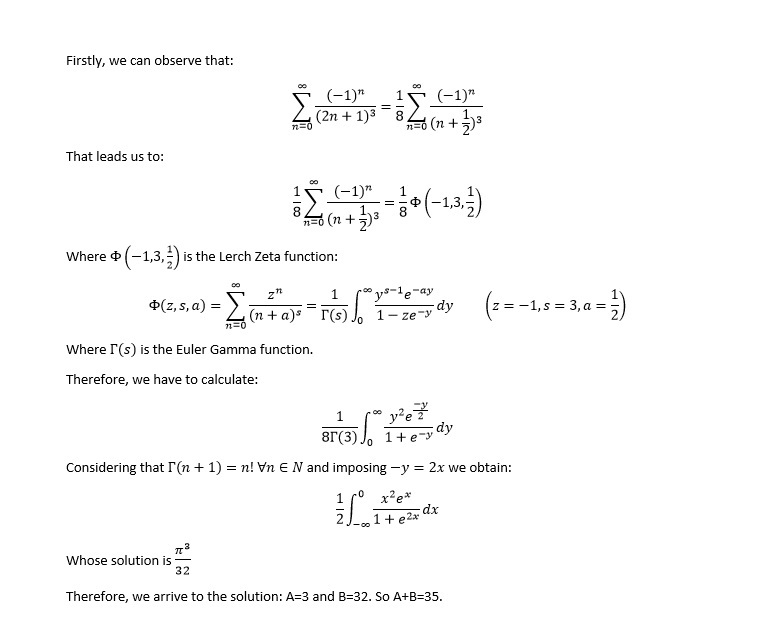Not Catalan's Constant
n = 0 ∑ ∞ ( 2 n + 1 ) 3 ( − 1 ) n = B π A
If the equation holds true for positive integers A and B , find A + B .
The answer is 35.
This section requires Javascript.
You are seeing this because something didn't load right. We suggest you, (a) try
refreshing the page, (b) enabling javascript if it is disabled on your browser and,
finally, (c)
loading the
non-javascript version of this page
. We're sorry about the hassle.
3 solutions
Let D N be the square contour with vertices at ϵ N + i η N for ϵ , η = − 1 , 1 . The function f ( z ) = π sec π z is meromorphic, even and antiperiodic with (anti)period 1 . Moreover ∣ f ( z ) ∣ ≤ π for all z ∈ D N for all N ∈ N . Thus 2 π i 1 ∫ D N z 3 f ( z ) d z = R e s z = 0 z 3 f ( z ) + n = 0 ∑ N − 1 ( R e s z = n + 2 1 + R e s z = − n − 2 1 ) z 3 f ( z ) for any N ∈ N . Letting N → ∞ , and using the evenness of f ( z ) , we deduce that 0 = R e s z = 0 z 3 f ( z ) + 2 n = 0 ∑ ∞ R e s z = n + 2 1 z 3 f ( z ) But this tells us that 0 = 2 1 π 3 − 2 n = 0 ∑ ∞ ( n + 2 1 ) 3 ( − 1 ) n and hence that n = 0 ∑ ∞ ( 2 n + 1 ) 3 ( − 1 ) n = 3 2 1 π 3 making the answer 3 + 3 2 = 3 5 .
You can show the series is equal to the integral much faster, by noting that 2 1 ∫ 0 ∞ 1 + e − 2 x x 2 e − x d x = 2 1 n = 0 ∑ ∞ ( − 1 ) n ∫ 0 ∞ x 2 e − ( 2 n + 1 ) x d x = n = 0 ∑ ∞ ( 2 n + 1 ) 3 ( − 1 ) n
The substitution y = e − 2 x converts the integral to the second derivative of a Beta function.
I didn't write the solution of the integral because it is a bit long.
Log in to reply
I would suggest to put that in, since readers would be interested to see such a colorful derivation.

n = 0 ∑ ∞ ( 2 n + 1 ) 3 ( − 1 ) n = = = = = = = 1 − 3 3 1 + 5 3 1 − 7 3 1 + ⋯ ( 1 + 5 3 1 + 9 3 1 + 1 3 3 1 + ⋯ ) − ( 3 3 1 + 7 3 1 + 1 1 3 1 + ⋯ ) n = 0 ∑ ∞ ( 4 n + 1 ) 3 1 − n = 1 ∑ ∞ ( 4 n − 1 ) 3 1 n = 0 ∑ ∞ ( 4 n + 1 ) 3 1 − n = 0 ∑ ∞ ( 4 n − 1 ) 3 1 − 1 4 3 1 [ n = 0 ∑ ∞ ( n + 1 / 4 ) 3 1 − n = 0 ∑ ∞ ( n − 1 / 4 ) 3 1 ] − 1 4 3 1 [ − 2 ψ 2 ( 1 / 4 ) + 2 ψ 2 ( − 1 / 4 ) ] − 1 3 2 π 3
For the last step reasoning is: use recursive formula for polygamma function and then use reflection formula for polygamma function and simplify.